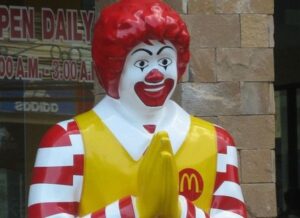McDonald’s Newest Menu Item? ‘Sustainabiliy Commitment’

McDonald’s, the world’s largest hamburger fast food chain serving more than 58 million customers daily, has recently announced its “Sustainable Land Management Commitment,” an effort they claim is designed to help them work more closely with suppliers to source the most sustainable options, whether agricultural raw materials or packaging.
In 2009, the fast food chain began a comprehensive analysis of its supply chain, and partnered with the environmental group, The World Wildlife Fund, to identify the most sustainable opportunities available in five of their most important categories: beef, poultry, coffee, palm oil and packaging.
McDonald’s joined the WWF at the first Global Conference on Sustainable Beef in November 2010 to explore what they call “areas of opportunity to drive continuous improvement throughout the global beef system.”
McDonald’s use of chickens has long been a sore spot for environmentalists and animal rights advocates. Waste from chicken farms is highly toxic and damages water, air and soil quality, and like all factory farmed animal operations, uses an incredibly high amount of resources such as fresh water. Chickens represent the largest number of land animals killed for food and do not have as many humane regulations in place as cows or pigs. People for the Ethical Treatment of Animals (PETA) has been trying to work with the chain for years to get them to adopt controlled atmosphere killing (CAK) in the U.S.— a much more humane slaughter method already used by McDonald’s European suppliers. There’s no mention of slaughter in McDonald’s new Sustainable Land Management Commitment, but they say that in 2011 they will work “with our direct poultry suppliers to identify best practices related to waste/litter management and determine the proper metrics on how to measure improvements.”
The chain also plans to be on 100 percent certified sustainable palm oil by 2015. Palm oil has a huge impact on globally traded commodities, according to the Rainforest Action Network’s Website, and is used in 50 percent of all consumer goods, from food to cleaning products. But it’s also a highly destructive crop, threatening rainforests, causing massive animal and plant extinctions, and is a source of greenhouse gas emissions, as well as controversial labor rights issues.
McDonald’s also claims that they will be sourcing sustainable, third-party certified coffee and will be working with the Forest Stewardship Council on wood certification for their packaging products.
Keep in touch with Jill on Twitter @jillettinger
image: grahamhills

